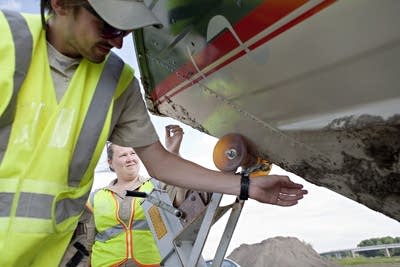Cheers, jeers for DNR invasive species fight in Detroit Lakes
Go Deeper.
Create an account or log in to save stories.
Like this?
Thanks for liking this story! We have added it to a list of your favorite stories.

After a summer of watching invasive species spread to more lakes, Minnesota lake property owners worry the Department of Natural Resources and local governments are not doing enough to stop the spread of aquatic invasive species.
About 100 people packed a meeting Tuesday night in Detroit Lakes to express their frustration with how the inspections are going and what to do next. Some people challenged the DNR to do more. Others called for more state spending and tougher laws to slow the spread of invasive species. Some challenged state officials, local government and lake residents to work together and pool resources.
Del Larson, of Moorhead, has a lake home north of Detroit Lakes. He volunteers as an inspector at a boat ramp on Floyd Lake, finds many boaters seem unaware of invasive species laws, and says the state Legislature needs to toughen penalties so boaters and anglers take the aquatic invasive species risk seriously.
"I think the fines are inexpensive. They're just a slap on the wrist," Larson said. "If you're going to wreck an environment it should be losing your boat and your truck, your fishing gear and your privileges to fish and a $10,000 fine."
Turn Up Your Support
MPR News helps you turn down the noise and build shared understanding. Turn up your support for this public resource and keep trusted journalism accessible to all.
Lake residents in the Detroit Lakes area have battled invasive plants for years. But the recent arrival of zebra mussels is creating what one resident described as a new era of risk.
Chuck Church says he wants to see action, not more talk about possible solutions. Church lives in Becker County, on Bad Medicine Lake, which does not have zebra mussels in it yet.
Church says public concern needs to catch up with the threat posed by invasive species to lake property owners, local businesses and state and local government.
"That's the time lag that's very critical. When are we finally as a culture going to realize that this is a really big problem?" he said. "This affects everybody's pocketbook."
Steve Hirsch heads the DNR Division that oversees aquatic invasive species programs. He mostly listened during the public meeting. Afterwards, he said the DNR wants to encourage more local involvement in the fight against invasive species, so he was pleased to see so many people engaged with the issue.
"You get frustration once in a while and with that frustration sometimes DNR takes a little heat. And that's just the way it is and it goes with the territory in DNR," he said. "But I think most people understand that you've got to get past that, and this is such a tough issue that if we don't pool our resources and work together we're never going to tackle it the way we need to tackle it."
At least one lake property owner says people should stop blaming the DNR for the spread of invasive species. Steve Lindow volunteered hundreds of hours as an inspector at Bad Medicine Lake this summer. He says very few lake residents or anglers offer to help protect lakes from the threat of invasive species.
"We always want somebody else to fix our problems -- the DNR, or the county or somebody else. We have to take responsibility too. And that's the piece that people are trying to avoid by blaming the DNR," he said.
Becker county officials are discussing new ways to fight invasive species, from restricting access to lakes, to setting up city run boat decontamination sites, to expanding education about invasive species into local schools. The county has a task force charged with developing a comprehensive plan in the coming weeks.
Dear reader,
Political debates with family or friends can get heated. But what if there was a way to handle them better?
You can learn how to have civil political conversations with our new e-book!
Download our free e-book, Talking Sense: Have Hard Political Conversations, Better, and learn how to talk without the tension.




